How can our Glaucoma Specialist Help You?
Our eyes play a crucial role in how we see and interact with the world, making their care a top priority. Regular eye exams are an important step in catching potential problems before they develop into serious conditions.
However, many eye diseases progress slowly and without noticeable symptoms, which is why staying on top of checkups is essential for long-term eye health.
Glaucoma is among the most concerning conditions as it can develop quietly over the years. If the early signs of glaucoma go undetected, it can lead to permanent vision loss.
At Kvitle Eye Care Associates, Dr. Jason Kvitle, a highly skilled glaucoma specialist, is dedicated to protecting your vision. He uses advanced diagnostic tools and personalized care to help patients stay ahead of this stealthy condition.
What is glaucoma?
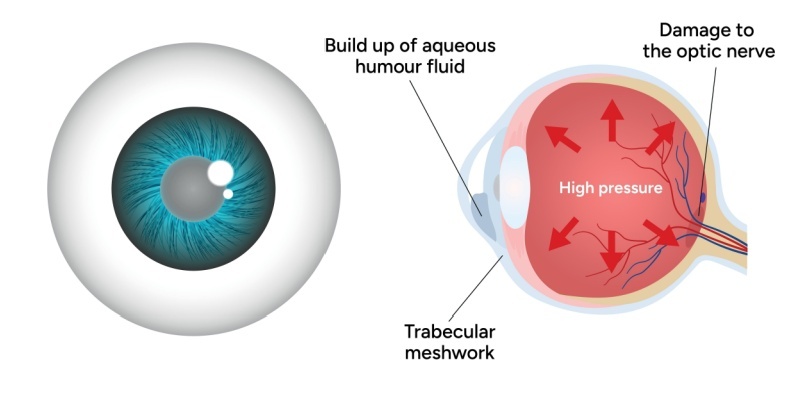
Glaucoma is a collection of eye conditions that affect the optic nerve, the part of the eye responsible for transmitting visual information to the brain. This damage is often caused by a buildup of fluid which can’t drain properly, increasing pressure within the eye. Over time, this can gradually harm the optic nerve, leading to vision loss and, if untreated, blindness.
Types of glaucoma
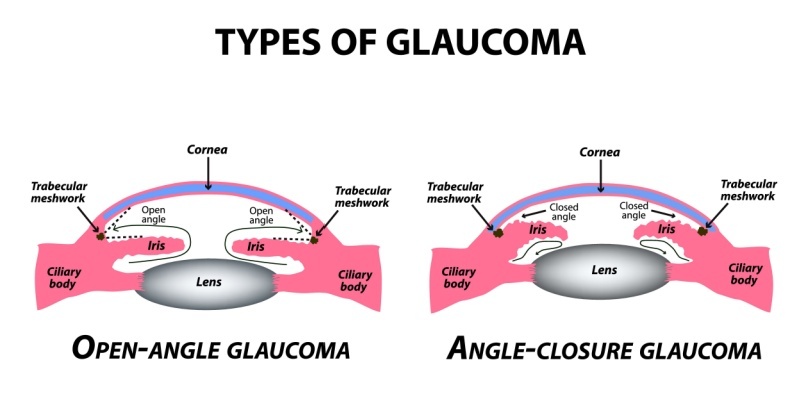
There are several types of glaucoma, however the two main types are primary open-angle glaucoma and angle-closure glaucoma. Here’s a more detailed breakdown:
Primary open-angle glaucoma: This is the most common type of glaucoma. It develops gradually when fluid doesn’t drain properly, leading to increased pressure. Because it progresses slowly without symptoms at first, regular checkups are key to catching it early before it advances to a stage where significant permanent damage has already occurred.
Angle-closure glaucoma: This less common type occurs when the eye’s drainage angle becomes blocked, causing a sudden rise in pressure. Symptoms may appear quickly, making it important to seek immediate medical attention as soon as this happens.
Symptoms of glaucoma

Although glaucoma can initially develop without noticeable symptoms, as the condition progresses, signs may start to appear.
The most common symptom associated with open-angle glaucoma is peripheral vision loss which progresses slowly, hence not being apparent at first.
If you experience any of the following signs of angle-closure glaucoma, it’s important to seek medical attention promptly:
- sudden, intense eye pain
- blurred or patchy vision
- redness in the eyes
- frequent headaches
- eye tenderness or discomfort
- nausea or vomiting
- halos or rings around lights
These symptoms indicate that sudden rise in internal eye pressure associated with angle-closure glaucoma which is considered an emergency.
Are you at risk?

Certain factors can increase your likelihood of developing glaucoma. Knowing your risk is the first step toward protecting your vision. Here are a few things to keep in mind:
- being over 60
- family history of glaucoma
- being of African, Asian or Hispanic descent
- conditions like diabetes or hypertension
- severe nearsightedness
- history of eye injuries
- prolonged use of steroids
Do any of these factors sound familiar? Don’t worry, being aware of your risk means you’re already ahead of the game. Regular screenings can help you stay in control and catch any potential issues early, giving you peace of mind and a clear path forward.
Why early detection matters
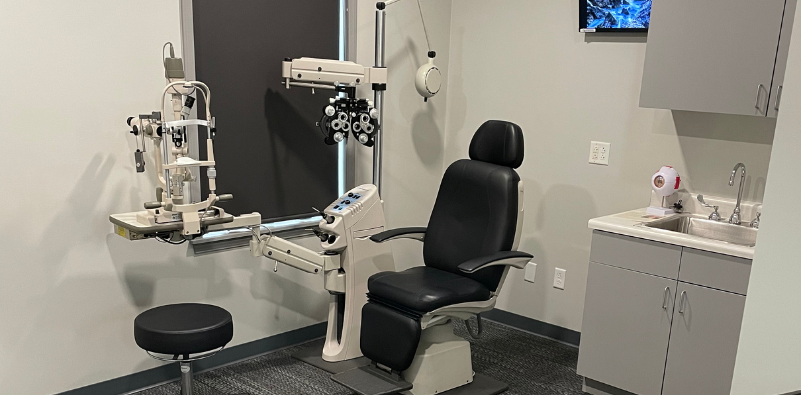
Glaucoma is often called the “silent thief of sight” because it progresses without warning. Early diagnosis allows for prompt detection and treatment, which can slow the disease’s progression and help preserve vision for years to come.
What to expect during a glaucoma screening
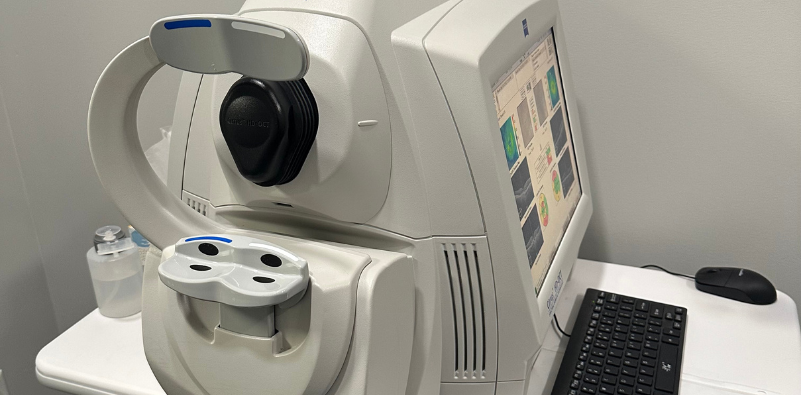
At Kvitle Eye Care Associates, we make glaucoma screenings a comfortable and informative experience. During your one-hour appointment, Dr. Kvitle will guide you through a series of non-invasive tests to assess your eye health.
These include:
Optical coherence tomography (OCT): This advanced, painless imaging technique captures detailed 3D cross-sectional images of the optic nerve to help identify any early damage and pinpoint the exact location and severity.
Visual field test: This checks your peripheral vision to identify if you are experiencing any loss in that field of vision, which may indicate glaucoma.
Intraocular pressure measurement: After numbing your eyes, Dr. Kvitle will perform an eye pressure test using state-of-the-art Goldman tonometry. This reliable method detects increased pressure, a key indicator of glaucoma.
Corneal pachymetry: If necessary, Dr. Kvitle will measure the thickness of your cornea, the clear, dome-shaped surface at the front of your eye. Measuring its thickness can help assess your glaucoma risk, as thinner corneas are associated with a higher likelihood of developing the condition.
These tests are safe, quick, and designed to give you a complete picture of your eye health. Afterwards, Dr. Kvitle will explain your results and, if needed, create a personalized care plan tailored to your needs.
Expert care and trusted partnerships
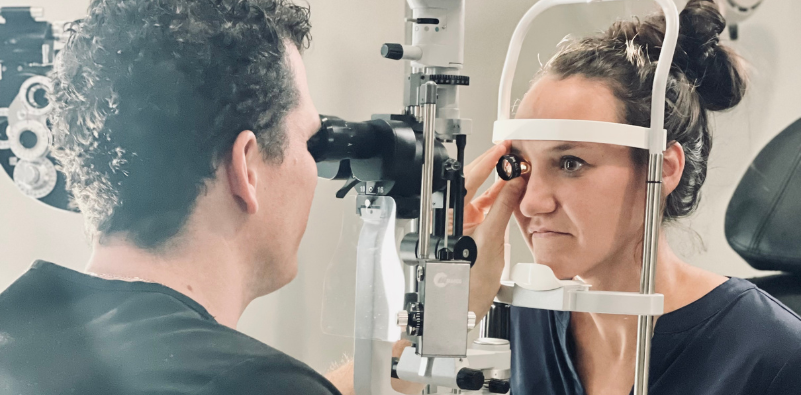
We’re committed to providing consistent, high-quality care. We keep detailed records of your eye examinations and test results to track changes over time and adjust treatments as needed. Our goal is to provide consistent, high-quality care for every patient.
We have strong partnerships with leading eye disease specialists in the area for cases requiring advanced treatment. If a referral is necessary, you can trust that you will receive expert care from highly regarded professionals that we work closely with on a regular basis.
Take charge of your eye health
Your vision is one of your most valuable assets, and taking care of it doesn’t have to be complicated. Whether you’re in a high-risk group or simply want to stay on top of your eye health, scheduling a glaucoma screening is a great step.
Dr. Kvitle, your trusted eye doctor in Quincy, Illinois, and our friendly team are here to provide expert, compassionate care based on your individual needs. Let us help you protect your vision today and for the future.
 1107 College Ave Quincy, IL 62301
1107 College Ave Quincy, IL 62301


